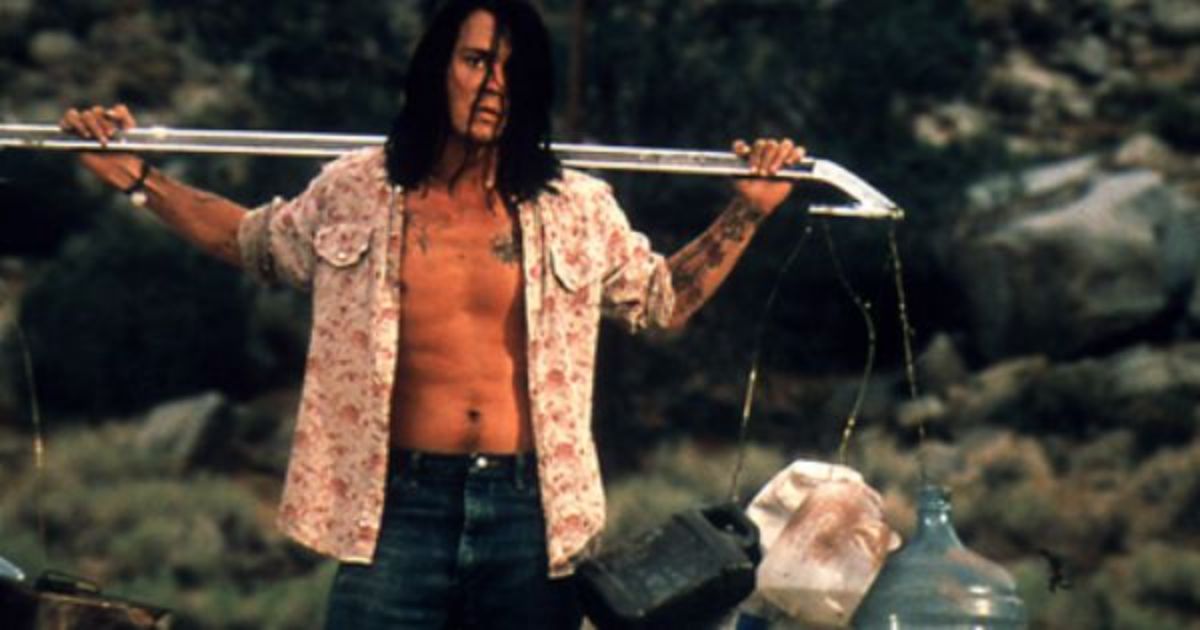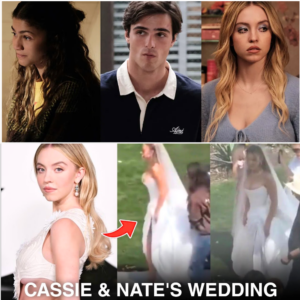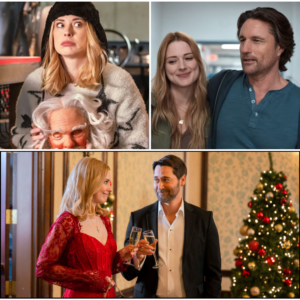In the glittering world of Hollywood, where Johnny Depp has long reigned as a chameleon of eccentric roles—from swashbuckling pirates to whimsical hatters—his most haunting tale doesn’t unfold on the silver screen but behind it. The year was 1997, and Depp, at the peak of his acting career, ventured into uncharted territory as a director with The Brave, a film that promised to be a bold artistic statement but instead became a grueling ordeal that left him physically exhausted, emotionally shattered, and millions of dollars in debt. This is the story of how a single project, driven by passion and sacrifice, nearly derailed one of Hollywood’s brightest stars and why its shadow still looms over Depp’s legacy.
A Dark Vision Born from Tragedy
The Brave, adapted from Gregory McDonald’s novel Rafael, Last Days, tells the harrowing story of Raphael, a Native American man living in poverty near a junkyard with his wife and children. Desperate to provide for his family, Raphael accepts a chilling offer from a mysterious producer, played by Marlon Brando, to star in a snuff film—a movie where he would be tortured and killed on camera—for $50,000. The film’s themes of sacrifice, desperation, and social inequality resonated deeply with Depp, who saw it as a chance to explore the human condition beyond the glitz of mainstream cinema.
But the project’s origins were steeped in darkness even before Depp’s involvement. In 1993, the script, penned by Paul McCudden, caught the attention of Hollywood studios despite its grim premise. Disney’s Touchstone Pictures greenlit the film, with first-time director Aziz Ghazal attached. Tragically, before production could begin, Ghazal committed a horrific act, killing his wife and daughter before taking his own life. His disappearance stalled the project, leaving producers Charles Evans Jr. and Carroll Kemp, who had invested heavily, scrambling to salvage it. By 1994, they approached Depp, then a rising star known for films like Edward Scissorhands and What’s Eating Gilbert Grape, to take the helm.

Depp, initially unimpressed with the script, was moved by the story’s core idea: a man’s ultimate sacrifice for his family. He agreed to rewrite, direct, and star in the film, pouring his heart into reshaping the narrative alongside his brother, D.P. Depp, and McCudden. Little did he know that this decision would thrust him into one of the most punishing experiences of his career.
A Hellish Shoot in the Desert
Filming The Brave was a logistical and physical nightmare. The production set up in Death Valley, where temperatures soared to 130 degrees Fahrenheit, turning the set into a furnace. Depp, juggling roles as director, co-writer, and lead actor, found himself stretched to his limits. Unlike his usual acting gigs, where he could retreat to a trailer between takes, directing demanded constant oversight. He described the experience as feeling like he was “working in an oven,” with no respite from the relentless heat and pressure.
The desert’s harsh conditions tested the entire crew. Equipment malfunctioned under the extreme temperatures, and the cast, including Elpidia Carrillo as Raphael’s wife and young actors Cody Lightning and Nicole Mancera as his children, endured long, grueling days. Marlon Brando, a cinematic legend and Depp’s friend, made a brief but pivotal appearance as the snuff film producer, McCarthy. His scenes, shot in a dark warehouse, added a surreal intensity, but his limited screen time—less than five minutes—disappointed some fans expecting a larger role.

Depp’s commitment went beyond creative control. With an estimated budget of $5 million, he personally financed overruns, reportedly investing up to $2 million of his own money to keep the project afloat. This financial gamble, coupled with the physical toll of shooting in such inhospitable conditions, left him drained. Nights were spent rewriting scenes and preparing for the next day’s shoot, with little time for rest. Depp later confessed that he felt like he was “going to die” every day, his dreams haunted by the film’s imagery and responsibilities.
A Personal and Artistic Sacrifice
For Depp, The Brave was more than a film—it was a deeply personal exploration of sacrifice and redemption. He saw parallels between Raphael’s plight and real-world struggles, particularly among marginalized communities. The film’s setting, a shantytown beside a garbage dump, underscored themes of poverty and social exclusion, while Raphael’s decision to trade his life for his family’s future carried a Christ-like weight. Symbolic imagery, such as Raphael carrying water pails on a stick across his shoulders, reinforced this allegory, though some critics later called it heavy-handed.

Depp’s performance as Raphael was deliberately understated, a stark contrast to his more flamboyant roles. He aimed to portray a broken man with quiet dignity, avoiding Hollywood’s tendency to romanticize Native American characters. However, his casting as an Indigenous character sparked controversy, with some questioning the authenticity of his portrayal—a critique that would resurface years later with his role as Tonto in The Lone Ranger.
The film’s score, composed by Iggy Pop, who also made a cameo, added an eerie, haunting layer. Pop’s music, reminiscent of Neil Young’s work in Dead Man, amplified the film’s bleak atmosphere. Supporting performances, particularly Clarence Williams III as a conflicted priest and Luis Guzmán as Raphael’s volatile former partner, brought depth to the ensemble, but the film’s slow pace and somber tone challenged conventional storytelling.
The Cannes Catastrophe
After months of grueling production and editing, The Brave premiered at the 1997 Cannes Film Festival, a prestigious platform for bold cinema. Depp, aware that the film’s niche appeal and lack of a major studio marketing budget relied on critical acclaim, hoped for a warm reception. Instead, the screening became a turning point—for all the wrong reasons.
American critics tore the film apart, calling it “turgid,” “narcissistic,” and “unbelievable.” They criticized its pacing, which lingered on silent, atmospheric shots, and accused Depp of self-indulgence, with the camera often focusing on his character’s brooding presence. The reviews were not just negative—they were vicious, with some likening the film to a pretentious misstep by a Hollywood star overstepping his bounds. Depp, who had poured his heart, soul, and savings into the project, was blindsided. He later recalled feeling “eaten alive” by the backlash, describing the reviews as a personal attack on his daring to direct.
The Cannes response devastated Depp emotionally. He had anticipated some criticism but was unprepared for the ferocity of the rejection. In a bold and defiant move, he chose not to release The Brave in the United States, preferring to let it “sit in a vault” rather than subject it to further scrutiny. The film saw limited theatrical and DVD releases in Europe and Asia, where it garnered a small but dedicated cult following, but it remains unavailable in North America to this day, a rare artifact in Depp’s filmography.
The Lasting Impact on Depp and Hollywood
The failure of The Brave left deep scars. Financially, Depp’s $2 million investment was a significant loss, especially for an actor still building his fortune in the pre-Pirates of the Caribbean era. Emotionally, the experience was crushing. He called directing the film “a nightmare” and vowed never to return to the director’s chair, a promise he has kept, focusing instead on acting and producing through his company, Infinitum Nihil.
Yet, The Brave wasn’t without its defenders. Some fans and international audiences praised its raw emotion and unflinching portrayal of poverty. They argued that its slow, deliberate pace was intentional, inviting viewers to sit with Raphael’s despair and resolve. The film’s exploration of sacrifice and morality, while heavy, resonated with those who saw it as a critique of societal neglect. Over time, it has gained a reputation as a “hidden gem,” with Depp enthusiasts seeking out bootleg copies to experience his directorial vision.
For Hollywood, The Brave serves as a cautionary tale about the risks of passion projects. Depp’s experience underscores the industry’s unforgiving nature, where even a bankable star can falter when stepping outside their comfort zone. It also highlights the challenges of financing and distributing unconventional films, particularly those tackling dark, uncommercial themes. Depp’s decision to withhold the film’s U.S. release was a rare act of artistic control, prioritizing his vision over commercial pressures, but it came at a steep personal cost.
A Legacy of Courage and Regret
Nearly three decades later, The Brave remains a paradox in Johnny Depp’s career—a film that embodies both his boldest ambitions and his deepest regrets. It showcased his willingness to take risks, to tell stories that others might shy away from, and to invest himself fully in his art. But it also revealed the limits of that ambition, exposing him to physical, emotional, and financial hardships that left lasting wounds.
Depp himself has reflected on the experience with a mix of pride and pain. He acknowledged mistakes, such as his reluctance to cut scenes to spare actors’ feelings, but stood by the film’s core message. “I liked the idea of sacrifice for family,” he said, a sentiment that drove him to endure the ordeal. For fans, The Brave is a testament to his versatility and courage, even if it’s a chapter he’d rather not revisit.
As Hollywood continues to churn out blockbusters, The Brave stands as a reminder of the industry’s complex relationship with art and risk. It’s a story of a star who dared to dream beyond the spotlight, only to find himself burned by the very world that made him. For those who seek it out, the film offers a glimpse into Depp’s soul—a fleeting, flawed, but unforgettable moment in a career defined by defying expectations.


